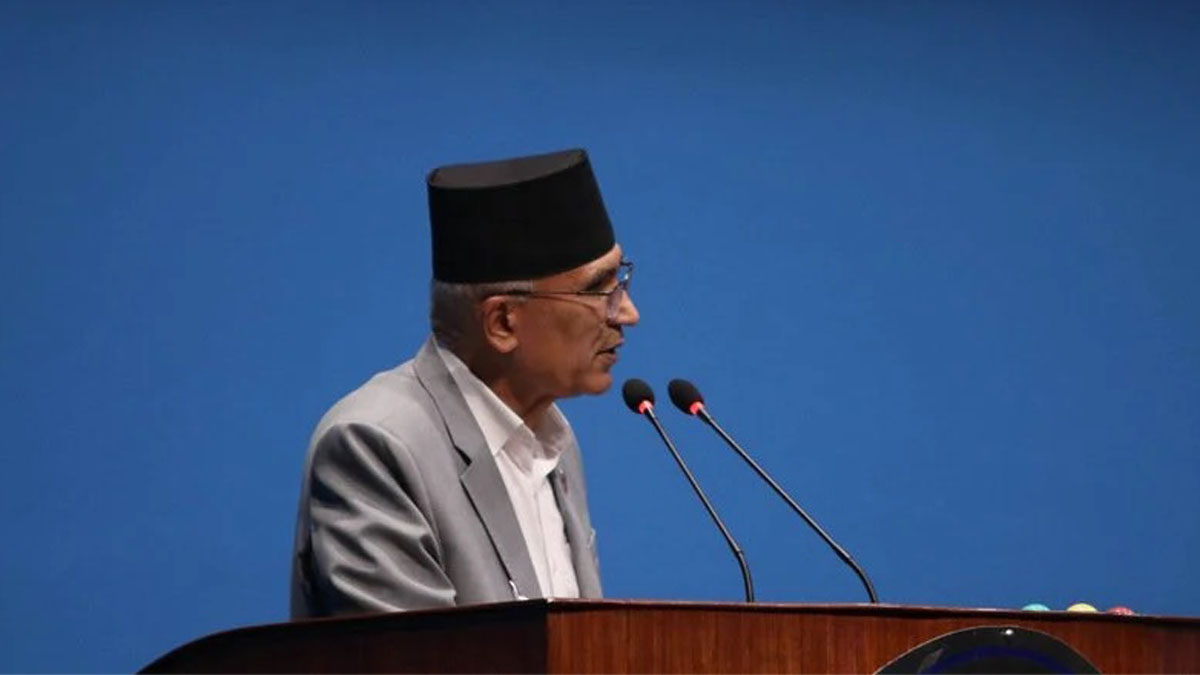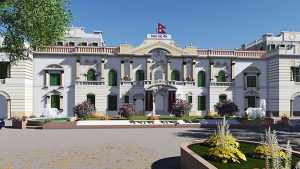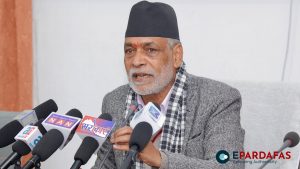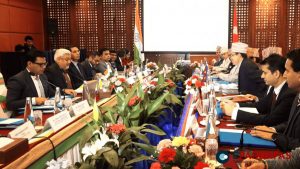
Budget fails to accept realities of economy: Former Finance Minister Paudel

Lawmaker and former Finance Minister Bishnu Prasad Paudel has said the budget for the upcoming fiscal year 2023-24 has failed to accept the reality of economic slowdown and to fall in line with the government policies and programmes.
Taking part in the deliberations on the government’s estimations of its annual revenue and expenditures for the upcoming fiscal year in a meeting of the House of Representatives (HoR) today, he said priorities and plans mentioned in the new policies and programmes were not given a space in the budget.
“This budget lacks a coherence and consistency with its policies and programmes and principles and priorities,” he said, adding that it was inconsistent with the policies and programmes. Matters of granting a discount on electricity tariff (up to 30 units in winter and up to 50 units during the monsoon) and the programme to develop the Geta Medical College as the Dashrathchand Medical University are missing in the budget,” he said.
The budget has failed to recognize the existing economic issues, assess its challenges and opportunities and present possible ways for the solutions, according to the leader.
“Economic growth below 2.16 percent, 7.5 percent consumer price inflation, current account deficit worth over Rs 54 billion and the situation suggesting the negative reserve fund by Rs two billion by the end of the current fiscal year have not been addressed by the budget,” he said.
As he evaluated, 7.96 percent banking loan disbursement in private sector, negative Gross Domestic Growth in first and second quarters of the current fiscal year, economic slowdown, a significant loss in employment opportunities and skyrocketing price suggest the Nepalese economy is marred by a crisis.
He went on to say that 38.12 percent capital expenditure, mobilization of foreign grants less than 10 percent of the targets and a fall in revenue collections: by 12 percent than the last fiscal and 56 percent of the target this year provided a room to question about the government capacity to effectively steer the national economy.
The projection of an economic growth in the upcoming year less than the current fiscal and a fall in the appropriations suggest that the government is not capable to mobilize the available resources fully, according to the lawmaker.
“The existing scenario of capital market reflects the situation of national economy,” he said adding that three years ago, the Nepal Stock Exchange Index had touched 3,200 with daily turnover up to 20 billion. But now, it dwindled to 1950 with Rs two billion daily turnover. The market capitalization has shrunken from Rs 450 billion to Rs 280 billion,” the leader said, adding that none was ready to take responsibility for this negative picture of capital market.
According to him, although it is mentioned in the Budget statement to decrease the current expenditure, the current expenditure proposed for the upcoming fiscal year is more by 97 billion compared to the current fiscal year’s current expenditure. Poudel stated the allocation towards capital expenditure, which was around 20 per cent of the total budget on an average since the last six years, has been reduced to 17 per cent this time.
“On the one hand it is mentioned in the budget that implementation of fiscal federalism would be emphasized while on the other hand the fiscal transfers to the province and local levels have been allocated with deficit of Rs 29.75 billion as compared to the allocations of the current fiscal year. In this way, the resource management and the allocation made for the current and capital expenditures in this budget are unrealistic, unbelievable, self-contradictory and difficult to execute,” argued the former Finance Minister.
Removing and downsizing the capacity of the past programmes like the Prime Minister Employment, the President Educational Reform, the President Women Empowerment, the Prime Minister Agriculture Modernization, urbanization of the district headquarters of the Tarai districts, industrial zone infrastructure and issuing loans keeping the academic qualification certificates as collateral, among others indicated that the Budget is taking pleasure not in ‘game change’ but only in ‘name change’, Poudel sarcastically said of the Budget.
He commented that the budget has not allocated money for providing compensation for health insurance, delimited the provision of asking for loans by keeping the academic certificates as collateral and scattered the budget even in the projects implemented by the local level wards and municipalities.
The former Finance Minister said the budget has not addressed to the potentiality in the water resources, tourism and agriculture sectors, and it lacked novelty. “Rather it is like the continuation of the past programmes,” he added.
According to him, some programmes in the budget were highly contradictory. Stating that the programme of exporting stones and pebbles abroad by quarrying the Chure had met with opposition in the past, and wondered on what ground this programme was been brought in the present budget. Likewise, Poudel expressed his objection regarding the beneficiary of the Citizen Pension programme, its action plan and sources included in the budget.
Poudel also termed as inappropriate the decision made by the government through the budget statement to dissolve and merge 20 various government corporations for reducing the expenses. In his view, the government should cut down on the facilities of the President, the Vice President, members of the Council of Ministers, and lawmakers among others for reducing the expenditure.
The former Finance Minister also took exception to the provision of the budget providing Rs 50 million to the MP through the Parliamentary Constituency Infrastructure Development Programme. He also declared in the parliament that he wished to spend the amount under this programme he gets as a parliamentarian in the construction of infrastructures in public education sector through the ministry concerned.
Former Finance Minister Poudel claimed the change in the tax rate in the budget is also not logical. He is of the view that the government should address the justified demands made by the private and cooperative sector, and share market investors, saying they were dissatisfied with the tax proposed by the government.
Meanwhile, speaking in the meeting of the House of Representatives today, lawmaker Deepak Giri viewed that the parties should not be divided into ruling and opposition bench in policy matters as budget but should move ahead by making programmes collectively. He also called on the lawmakers to be responsible to the citizen towards addressing their problems, no matter how petty they might seem to be. Giri also called on the parliament to rethink the time of presenting budget in parliament.
- Government Ordinance Driven by Necessity, Not Intention: Minister Prithvi Subba Gurung
- Dr. Shekhar Koirala Highlights Nepal-Britain Relations and Future Aspirations at British Parliament
- Fonepay Approves 10.53% Dividend at Fifth AGM
- Half-Yearly Budget Review: Government Achieves 39% of Income Target, 35% of Expenditure












Comments